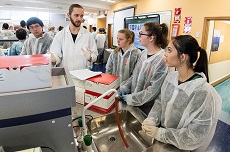Local high school students try science on for size
A group of secondary school students spent the first Saturday of their holiday break in a Victoria University laboratory sampling the life of a scientist.

A group of secondary school students spent the first Saturday of their holiday break in a Victoria University of Wellington laboratory sampling the life of a scientist.
Over 60 students and their teachers attended a workshop last weekend hosted by the School of Biological Sciences, where they learnt about DNA sequencing and local ecology.
“A key purpose of the day was to give students a taste of studying biology at university and an understanding of what scientists do, and to stimulate their thirst for knowledge,” says workshop organiser Associate Professor David Ackerley.
“The students said they were really excited to be able to use some new scientific tools, in particular kits for extraction of DNA from soil, polymerase chain reaction tests that can detect the presence of tens of thousands of bacterial species that cannot be grown in the lab, and e-gels which provided a particularly rapid means of analysing their DNA.”
The attendees extracted DNA from soil samples collected from around New Zealand and analysed the bacterial communities that were present through computational analysis. They also heard short lectures from staff on aspects of metagenomics—the study of genetic material extracted directly from a complex environment.
“DNA sequencing has changed radically over the last ten years to the point that it is now possible to sequence an entire human genome—over three billion base pairs of DNA—in under a week, for only a few thousand dollars,” says Dr Ackerley.
“It’s been estimated that only one percent of all living bacterial species can presently be cultured in a laboratory, but using DNA sequencing as part of a “metagenomic” study allows us to examine the unculturable organisms too.
“My research team has a strong interest in trying to access this unculturable majority to recover their genetic blueprints for novel antibiotics and other drug candidates. This research was an ideal fit with the workshop, and the students got to interact directly with PhD students and postdoctoral researchers who are conducting this work.”
Dr Ackerley says he would particularly like to thank the School of Biological Sciences for providing food for the day. “60 hungry high schoolers can eat an impressive amount of pizza!”
The workshop was sponsored by Victoria, Auckland, Massey, Otago and Waikato universities, Custom Science, Kapa Biosystems, Omega Bio-Tek and the Allan Wilson Centre, and attended by eight secondary schools from around the Wellington region.
